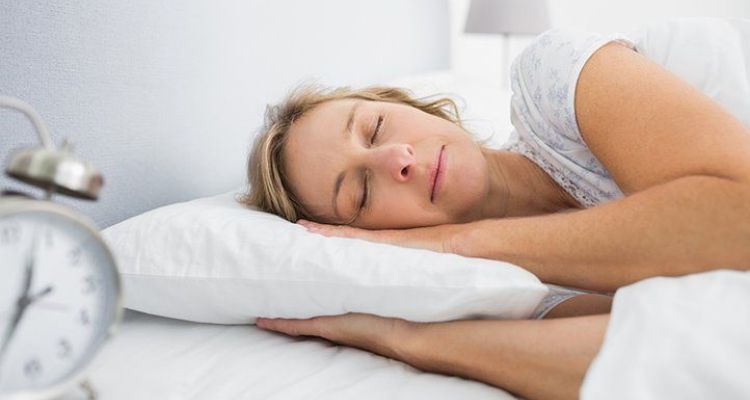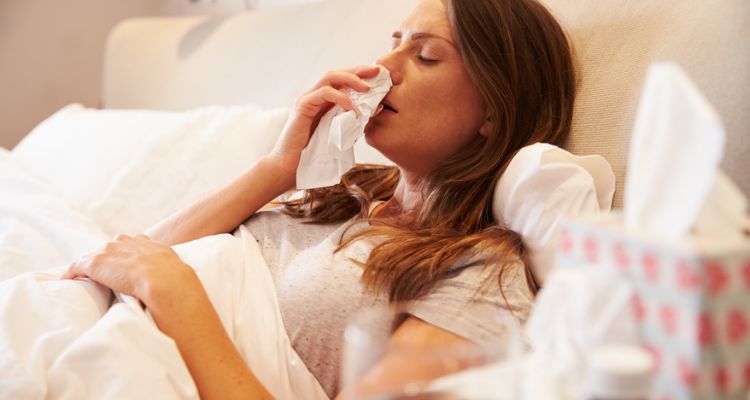A stuffy nose can cause discomfort throughout the night, keeping you awake, and you can do nothing to get rid of all your symptoms. You must be wondering about the best sleeping positions for sinus drainage.
To help you, we have listed some of the best tips and tricks to improve the symptoms of a stuffy nose and watery eyes.
What Side Do You Lie on For Sinus Drainage?

The lateral position serves as the best position for relieving sinus drainage. If you are suffering from sleep apnea (check the top rated mattresse for sleep apnea), sinus infection, or chronic condition, it is best to sleep on your side because it lessens the gravity effect on the throat muscles, reducing discomfort and snoring.
You can use positional therapy to elevate the head by keeping pillows (check the top-quality pillows with great comfort). Supporting the head is an excellent way to alleviate sinus symptoms.
Does Lying Down Make Sinus Drainage Worse?
Lying down can make the symptoms of sinus drainage worse. During the standing and sitting position, the blood circulates evenly throughout the body; gravity influences the easy flow of blood within the sinuses and head. During the vertical position, gravity helps drain the sinuses within the esophagus and the stomach.
As soon as you lay down, the body stops fighting against the delivery of blood towards the head. Increased blood flow within the sinuses can cause sinus congestion, pain, and excessive pressure.
As soon as gravity is not working to help drain sinuses, there are high chances of suffering from severe sinus symptoms. You might suffer from inflammation within the blood vessels and an exacerbation of your symptoms.
What Is the Best Head Position for Drainage?
The best head position for sinus drainage is to keep the head propped up on the pillows, which helps drain the sinuses. With the head elevated, gravity can easily help drain the sinuses, reducing the excessive blood flow within the sinuses and leading to sinus congestion.
What to Do During the Day to Avoid Sinus During the Night?
Look at the tips you can perform before going to bed to improve the symptoms affecting your sinuses.
Resist the urge to blow your nose
Being normal individuals, we have the urge to use tissues if we suffer from a stuffy nose continuously, but blowing a nose is not advisable. According to the studies, it is seen that when you blow the nose, it results in excessive pressure within the nasal cavities, causing the fluid to drain within the sinuses from the nose.
Make use of acupressure
Acupressure is another crucial technique that can help relieve your stuffy nose. You can use your hands to activate pressure points within your sinuses.
Make sure to use the left and right index fingers to suppress the base of both nostrils. Hold it for around 3 minutes. If you are suffering from a sinus headache, press your fingers on the innermost side of your eyebrows for about 3 minutes.
Stay hydrated
You must stay hydrated as the thick mucus can remain in your nose, leading to congestion. Drinking fluids can aid in removing mucus, resulting in sinus drainage.
Eat something spicy
Spicy foods can also help in relieving sinus drainage. Capsaicin is another important chemical in chilies that helps thin the mucus.
Food that comes with this chemical helps in the relief of sinusitis. It stimulates the secretion of mucus, which makes the nose runnier. You can choose salsa, curries, and hot sauces for mucus secretion.
Use a decongestant
These medications help relieve nasal conditions and reduce the swelling within the blood vessels. They are available in the form of oral medications and nasal sprays. You can easily buy it over the counter.
Use an NSAID
NSAIDs, also known as non-steroidal anti-inflammatory drugs (NSAIDs), help relieve pain and inflammation. According to the studies, it is seen that NSAIDs are effective in reducing different symptoms like sneezing, muscle pain, joint pain, ear pain, and fever.
You can also buy them over the counter. Some examples of NSAIDs include naproxen, aspirin, and ibuprofen.
Keep pets out of the bedroom
To protect yourself against a runny nose, it is important to take measures that help in relieving sinus congestion. Pets can have a negative impact on your health and the air quality in your house and bedrooms.
Dog and cat dander are some of the most common triggering factors that can result in congestion and a runny nose. You can keep the pets out of the room, which helps with easy breathing and relief of sinus symptoms.
Avoid caffeine and alcohol
Caffeine is present in coffee, tea, and sodas, and it serves as a stimulant to give an energy boost. Caffeine is the key ingredient to making you dehydrated and making you stay awake throughout the night.
If you are suffering from sinusitis, you must avoid taking caffeine as it can produce thick mucus. If you take caffeine 6 hours before sleep, you might suffer from disruptive sleep.
Causes of a Sinus or Stuffy Nose?

Wondering which factors can result in a stuffy nose? Have a look at the following factors.
Allergies
They can easily affect sinuses at night, so much so that you may wonder why your sinuses become clogged at night; allergies are the primary cause of sinus infections. If congestion occurs during the night, allergies are an essential factor. Take specific measures to reduce inflammation and prevent the allergy from getting worse (also check the best selling mattresses for allergies).
Wash blankets and sheets often
Washing the sheets and blankets regularly can help remove the allergens that are the main cause of sinus infections.
Use allergenic pillowcases
Try using allergenic pillowcases so you don’t suffer from allergies when lying down on the pillows.
Remove dust
Dust is one of the major triggering factors that can result in allergies and cause sinus congestion. Clean the house regularly to get rid of all the dust and allergens.
Don’t use perfumed candles or incense in your home
If you are an allergy sufferer still unaware of what triggers a runny nose and watery eyes at night, avoid using perfume candles or scents within the home as they can result in a runny nose, causing congestion and difficulty sleeping at night.
Don’t smoke or let others smoke in your house
People who cannot sleep because of sinus problems should avoid smoking and tell friends and family members to refrain from smoking in their homes. Smoking can trigger your symptoms.
Use free and clear laundry detergents
Use a laundry detergent that is free of any harmful chemicals. Chemicals are toxins that cause congestion-like symptoms, including runny nose, watery eyes, and others.
Humidity level of your room
By keeping the room cool, you can humidify the environment of your bedroom. Avoid keeping it dry, especially during winter, as it can result in severe symptoms affecting your nose, ear, and throat.
Using humidifiers can help by adding moisture to your bedroom air. These devices do not alleviate cold symptoms but allow you to breathe easily. Keeping the air dry within your room can cause the nasal passages and throat to stay clear, which is why humidifiers are advised.
How do you manually drain your sinuses?
For manually relieving the symptoms, you can use over-the-counter medicines like decongestants, menthol lozenges, and antihistamines. They can help in relieving cold symptoms and sinus pressure.
You can manually drain the sinuses by performing an acupressure. In this procedure, you need to target pressure points that help relieve the sinus pressure. See the procedure listed above. You can prevent the sinuses from being blocked by keeping yourself hydrated and using spicy foods.
Draining sinuses can be achieved by gargling with salt water. You can try facial steam and hot showers, which helps with mucus secretion. Try drinking hot tea to clear up the mucus production in your nose. Drinking tea can be an anti-inflammatory and antioxidant agent, which helps relieve the symptoms of a stuffy nose.
You can also drain the sinuses by using essential oils. It helps in relieving the symptoms of congestion. Tea tree oil has antimicrobial and anti-inflammatory properties, which help with nasal stuffiness. Eucalyptus oil is a great choice for improving the symptoms of sinusitis. Peppermint oil comes with menthol, which helps in relieving your breathing properties.
Try the nasal sinuses by using nasal strips, which help improve breathing. Nasal strips are easily available over the counter.
You can use warm compresses, which help relieve the symptoms by clearing the nasal passages. Soak the warm compresses in warm water, then squeeze the towel and place it over your nose and forehead. Warm compresses help in relieving your discomfort and inflammation.
Key Takeaways: Best Sleeping Position For Sinus Drainage
Importance of Sleeping Position
Choosing the right sleeping position, specifically the lateral position, can help in effective sinus drainage. Elevating the head with pillows when sleeping can offer further relief from sinus congestion.
Lying Down Can Worsen Symptoms
Contrary to what one might assume, lying flat can actually exacerbate sinus drainage issues due to the impact on blood flow in the sinuses.
Daytime Practices for Nighttime Relief
Several daytime actions, from avoiding frequent nose blowing and practicing acupressure to consuming spicy foods and taking NSAIDs, can set the stage for a symptom-free night.
Environmental Adjustments
Simple changes in one’s environment, such as keeping pets out of the bedroom, avoiding caffeine, and maintaining a suitable humidity level, can reduce sinus-related disruptions during sleep.
Manual Sinus Drainage Techniques
Over-the-counter medicines, acupressure, and even certain essential oils can serve as hands-on solutions to drain the sinuses and alleviate discomfort.
Seeking Medical Intervention
If all else fails, there are medical procedures like balloon sinuplasty that offer long-term relief from chronic sinus issues.
Conclusion
Sinuses and nasal congestion are usually because of inflammation in your sinuses. When experiencing such symptoms, sleeping at night is difficult, so you can include the following things mentioned above to help you get rid of sinus congestion. Draining sinuses manually is easy using warm compresses, OTC medicines, and showers.
If none of this work, you can visit the doctor for balloon sinuplasty, which helps relieve chronic sinus infections. It is a minimally invasive procedure that provides healthy and long-lasting relief from sinusitis.
Hope this guide helps in draining your sinuses. Follow the best sleeping positions listed above to stay comfortable during sleep.

